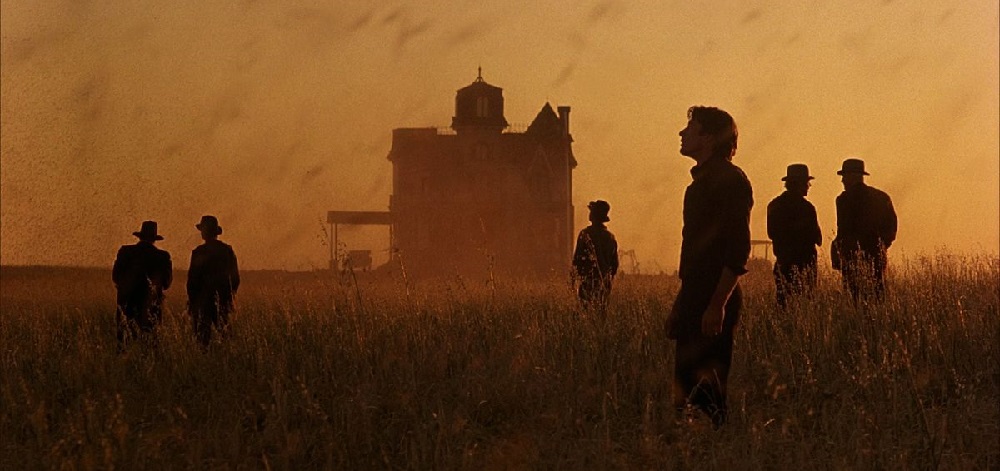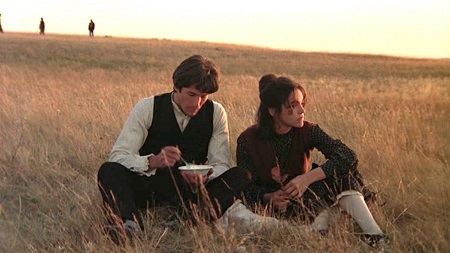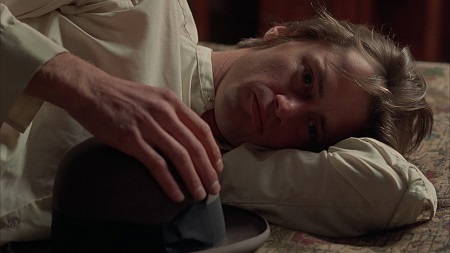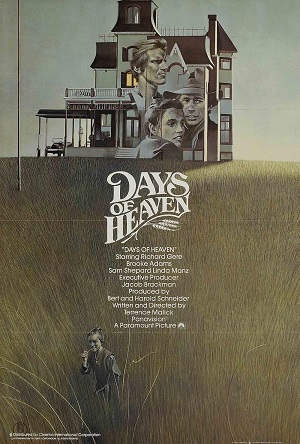
Unforgettables: Cinematic Milestones #21 – Days of Heaven (1978)
by Sara Michelle Fetters - October 18th, 2023 - Features
Terrence Malick’s ethereal, windswept ballad of love, lust, and nature’s wrath remains an otherworldly triumph
NOTE: This feature originally appeared in the September 29, 2023 edition of the Seattle Gay News.
The term “masterpiece” doesn’t come close to doing Days of Heaven full justice. This divine saga of love, friendship, greed, longing, desire, and sacrifice — Terrence Malick’s moody, gorgeously ethereal follow-up to his devastatingly killer 1973 debut, Badlands — is an absolute stunner from the first sun-drenched frame of wispy Texas fields of grain to the last. Now celebrating its 45th anniversary, this is one of the finest cinematic achievements I’ve ever seen.
What’s most unusual about Malick’s sophomore outing, even for the auteur-driven 1970s, is how fearlessly the director assaults traditional narrative convention. He puts the viewer on edge almost immediately, refusing to show things that would seem obvious to focus on and instead turning the spotlight onto other, seemingly more mundane items and events that at first glance would appear to be unimportant.
But they are anything but. On the surface it’s the story of two lovers, Bill (Richard Gere) and Abby (Brooke Adams), who are forced to flee early 20th-century Chicago for the secluded emptiness of the Texas panhandle by disguising themselves as brother and sister. But the emotional reality goes so much deeper than that. As narrated by Bill’s actual younger sister Linda (Linda Manz), the truth is a never-ending metaphorical sandstorm of relentless gray, and even the uncompromisingly honest are nowhere near as innocent as they initially appear.
This hook is that Bill, Abby, and Linda end up working at a nondescript farm in the middle of a vast nowhere, owned by a firm, if kindly, nobody (Sam Shepard). When the harvest ends, he asks them to stay on, mainly because he’s fallen in love with Abby, but also because he is secretly terminally ill and does not expect to live out the year. Bill convinces his lover to accept the farmer’s marriage proposal so that, when he dies, they’ll inherit his estate. Things do not go as planned.
Admittedly, I didn’t know quite what to make of Days of Heaven the first time I watched it. I’d never seen Badlands, and I had no idea who Malick was when I picked up the VHS cassette from my local video store. The rather nondescript, bright yellow box didn’t exactly scream that this was a drama I needed to watch, yet I still snagged it anyway. I figured, what the heck? It had Richard Gere, who I had just fallen in love with while watching An Officer and a Gentleman. That was good enough for me.
It sounded straightforward enough. But Malick, utilizing editing techniques and voiceover concepts he’d ultimately perfect 20 years later with his adaptation of The Thin Red Line, takes this familiar neo-noir conceit and turns it on its head. His film becomes a meditation on humanity’s relationship to nature, a treatise on constantly shifting perceptions of morality, a blistering social commentary, and, most affecting of all, a hauntingly tragic romance.
Nothing happened as I expected. As told by Linda, there is an almost Rashomon-like structure to her recollections, in which the fantastical desires of youth crash headfirst into the unrelenting realities of adulthood. Memories merge together in a constant, unfiltered stream, the described events flowing in a mostly linear fashion that still hint at a hardened, indissoluble time before the farm, along with an unknown yet still hopeful future, where tragedy can give way to something indescribably glorious and inner peace can thankfully still be found.
But as perplexed as I was, I could not tear my eyes off of the screen. Even on a pan-and-scan VHS, it was clear that this film was a visually audacious masterwork. The images composed by cinematographer Néstor Almendros (with a generous assist from “additional photographer” Haskell Wexler) were otherworldly, and I subconsciously became lost within them, overcome with hushed immediacy. It’s no wonder Almendros would win that year’s Academy Award.
It’s Adams who captivated me the most. As outstanding as she would be in thrillers like the remake of Invasion of the Body Snatchers (also released in 1978) and David Cronenberg’s magnificent adaptation of Stephen King’s The Dead Zone, her work as Abby remains the high point of the actor’s nearly 50-year career. Even with minimal dialogue, I was enraptured by her almost androgynous femininity. The way Adams coupled her physical expressions with her practical surroundings was undeniably eerie, and this led me to an almost instantaneous rewatch before I had to return the tape to the store the following day.
As the years have passed, I have returned to Malick’s film again and again. I’ve seen it in a theater on multiple occasions since moving to Seattle to attend the University of Washington, and it’s one of the few titles where I can say I’ve owned a copy in pretty much every format it’s been available in. So many moments, including the stunning locust attack and the dreamlike finale, where life and death become inexorably intertwined, are burned into my memory for eternity.
“Nobody’s perfect,” states Linda matter-of-factly during her narration. “There was never a perfect person around. You just have half-angel and half-devil in you.” It’s a cold statement, but a true one. We all are the sums of our inner angels and our inner devils, the pair in constant conflict, as if they were straight out of a Bugs Bunny or Donald Duck cartoon.
In Days of Heaven, Malick allows this internalized conversation to take human form. On this secluded Texas farm, where anything is possible and doom could still be waiting on the hay-covered floor of a musty barn, heaven and hell collide, and all that’s left afterward are the remains of good intentions and bad ideas equally plowed into oblivion.
Now celebrating its 45th anniversary, Days of Heaven is available on 4K Ultra HD, Blu-ray and DVD, and to purchase digitally in HD on multiple platforms. It is also streaming on Kanopy and Paramount+.






